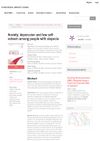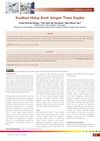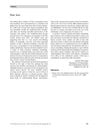 1 citations,
September 2022 in “Journal of dermatological science”
1 citations,
September 2022 in “Journal of dermatological science” Certain vitamins and their derivatives can help hair grow longer by activating specific growth signals.
 March 2024 in “Nutrients”
March 2024 in “Nutrients” Gynostemma pentaphyllum and its component damulin B could help hair grow by activating certain cell pathways.
 September 2021 in “Medicina estética”
September 2021 in “Medicina estética” Sabal serrulata and biomimetic peptides with microneedling reduced hair loss and improved hair thickness in men with balding.
 December 2018 in “Journal of Medicinal and Aromatic Plant Sciences”
December 2018 in “Journal of Medicinal and Aromatic Plant Sciences” Some plants like Eclipta alba, Nardostachys jatamansi, and Rumex japonicus may help hair growth.
 July 2021 in “IntechOpen eBooks”
July 2021 in “IntechOpen eBooks” Ginseng, especially its component ginsenosides, can promote hair growth, reduce hair loss, and potentially treat conditions like alopecia by affecting cell pathways and cytokines.
 2 citations,
June 2022 in “Molecules”
2 citations,
June 2022 in “Molecules” Connarus semidecandrus Jack extract promotes hair growth and thickness, reduces prostate cancer cell growth, and could potentially be used as a treatment for hair loss.
13 citations,
November 2022 in “Biomaterials Science” The microneedle patch effectively promotes hair regrowth by delivering miR-218.
5 citations,
February 2022 in “Stem cell reports” Thymic stromal lymphopoietin (TSLP) promotes hair growth, especially after skin injury.
 14 citations,
May 2020 in “Biomolecules & Therapeutics”
14 citations,
May 2020 in “Biomolecules & Therapeutics” Vanillic acid from wheat bran may promote hair growth by activating certain cell pathways and reversing hormone-related hair loss.
2 citations,
January 2022 in “Skin appendage disorders” Low-dose oral minoxidil effectively promotes hair growth but has associated risks.
 May 2024 in “Deleted Journal”
May 2024 in “Deleted Journal” Cancer treatments can cause hair loss, but it is often reversible and can be managed with scalp cooling and support.
 June 2022 in “Research, Society and Development”
June 2022 in “Research, Society and Development” COVID-19 may cause increased hair loss, but the exact reason is unclear and standard hair loss treatments are recommended.
 October 2023 in “The Cochrane library”
October 2023 in “The Cochrane library” The medicine baricitinib was found to notably improve hair regrowth in alopecia areata, but more research is needed on its side effects and other treatments.
 November 2019 in “Harper's Textbook of Pediatric Dermatology”
November 2019 in “Harper's Textbook of Pediatric Dermatology” The document is a detailed medical reference on skin and genetic disorders.
 11 citations,
May 2019 in “Journal of Cosmetic Dermatology”
11 citations,
May 2019 in “Journal of Cosmetic Dermatology” Mesotherapy helps treat male hair loss effectively.
 January 2012 in “Human health handbooks”
January 2012 in “Human health handbooks” Low-level light therapy is FDA-approved for male pattern hair loss, increases hair count and strength, and is considered safe for use.
 September 2023 in “Khyber Medical University Journal”
September 2023 in “Khyber Medical University Journal” People with alopecia often feel anxious, depressed, and have low self-esteem.
 October 2024 in “World Journal of Psychiatry”
October 2024 in “World Journal of Psychiatry” Stress worsens hair loss in androgenetic alopecia.
 January 2023 in “Archives of Disease in Childhood Education & Practice”
January 2023 in “Archives of Disease in Childhood Education & Practice” Hirsutism in teens is often due to polycystic ovarian syndrome and needs careful assessment and support.
 November 2023 in “Cermin Dunia Kedokteran”
November 2023 in “Cermin Dunia Kedokteran” Tinea capitis can affect mental health, but treatment improves both health and well-being.
 3 citations,
June 2023 in “MedComm”
3 citations,
June 2023 in “MedComm” Stem cells and their exosomes show promise for repairing tissues and healing wounds when delivered effectively, but more research is needed on their tracking and optimal use.
 1 citations,
August 2015 in “Current Sexual Health Reports”
1 citations,
August 2015 in “Current Sexual Health Reports” 5α-reductase inhibitors can cause serious and possibly lasting sexual and psychological side effects.
 December 2023 in “Current psychosomatic research”
December 2023 in “Current psychosomatic research” Psychological interventions can improve the quality of life for women with PCOS.
 77 citations,
July 2020 in “Journal of the European Academy of Dermatology and Venereology”
77 citations,
July 2020 in “Journal of the European Academy of Dermatology and Venereology” Environmental factors, hormones, nutrition, and stress all significantly affect skin health and aging.
 20 citations,
August 2018 in “Clinics in Dermatology”
20 citations,
August 2018 in “Clinics in Dermatology” The conclusion is that understanding and addressing the psychological effects of alopecia areata is important for effective treatment.
 21 citations,
August 2016 in “Translational Andrology and Urology”
21 citations,
August 2016 in “Translational Andrology and Urology” Delayed ejaculation is a complex issue caused by psychological, biological, and lifestyle factors, requiring a holistic treatment approach.
 June 2024 in “British Journal of Dermatology”
June 2024 in “British Journal of Dermatology” Permanent hair loss from chemotherapy significantly impacts patients' mental health and social life, highlighting the need for better patient education and support.
88 citations,
May 2020 in “Clinical therapeutics” Stress can worsen skin diseases by affecting immune cells, hormones, and neurotransmitters in the skin.
 1 citations,
July 2002 in “Clinical and Experimental Dermatology”
1 citations,
July 2002 in “Clinical and Experimental Dermatology” The document concludes that understanding hair loss and its psychological impact is crucial for physicians to provide effective counseling and treatment to patients.
 18 citations,
June 1988 in “Culture, medicine and psychiatry”
18 citations,
June 1988 in “Culture, medicine and psychiatry” The perception of excessive hair growth in women as abnormal is more influenced by cultural norms than by medical reasons.


























